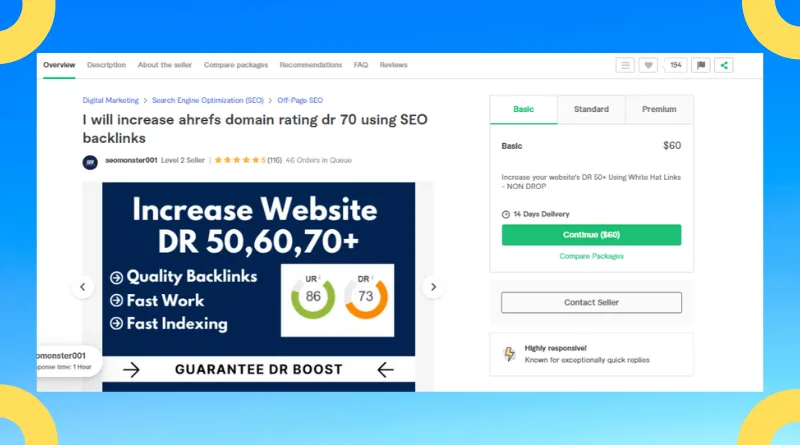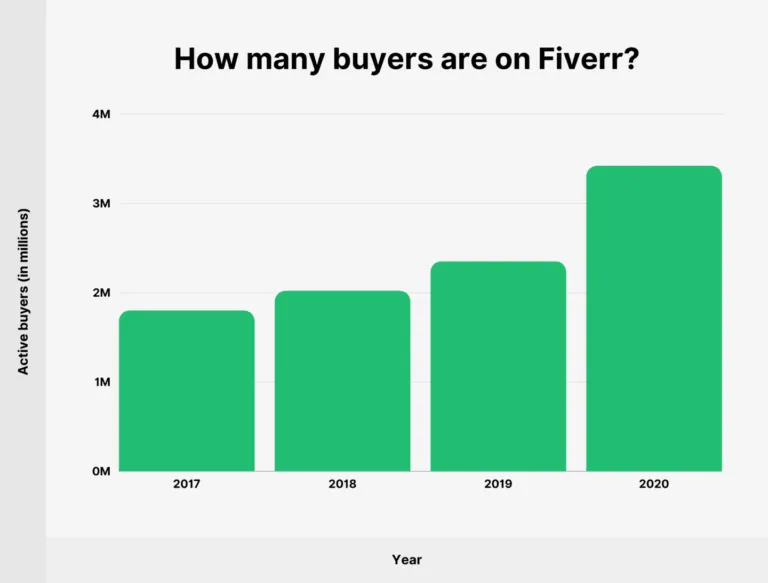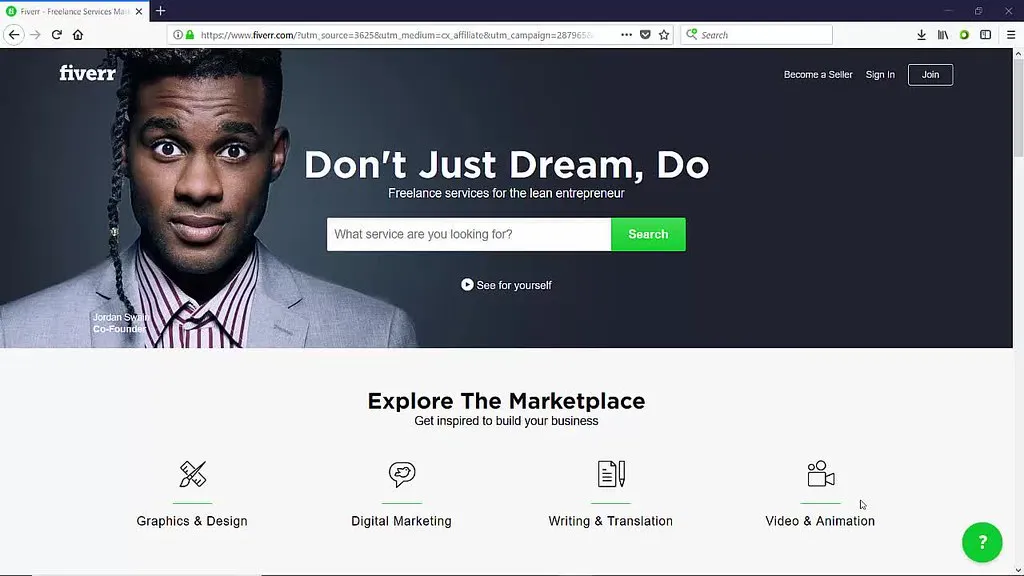Hey there! If you've heard about Fiverr, you're probably familiar with its ability to connect freelancers and clients seamlessly. But have you ever wondered where it all began? In this post, we're diving into the depths of Fiverr’s origins and its significant role in elevating the gig economy. So, grab a cup of coffee, sit back, and let’s explore the fascinating journey of this innovative platform!
2. What is Fiverr?

Fiverr is an online marketplace that has revolutionized the way people find and offer freelance services. Launched in 2010 by Micha Kaufman and Shai Wininger, the platform provides a space where freelancers—known as "sellers"—can offer their skills and services, and where clients—referred to as "buyers"—can easily access a wide range of offerings. Here’s a breakdown of what Fiverr is all about:
- Service Variety: Fiverr offers a plethora of services, ranging from graphic design, writing, and marketing to programming and music production. No matter what you need, there’s likely a Fiverr seller ready to tackle it!
- Price Point: The name “Fiverr” comes from the starting price of services, which initially began at just $5. While many services remain budget-friendly, sellers now have the flexibility to set their own prices.
- Easy Navigation: The platform is user-friendly, allowing buyers to easily search for services, review seller profiles, and make informed decisions based on ratings and reviews.
- Global Reach: Fiverr connects buyers and sellers from around the world, showcasing the diversity of skills, cultures, and perspectives.
Overall, Fiverr not only simplifies the hiring process but also empowers individuals to monetize their skills. This has made it a popular choice for businesses and freelancers alike!
Also Read This: How Does Fiverr Pay Out? Understanding the Payment Process
The Founding of Fiverr

Fiverr was founded in 2010 by Micha Kaufman and Shai Wininger, two entrepreneurs who wanted to create a platform that turned the gig economy into a seamless experience for both freelancers and clients. The idea was simple yet revolutionary: offer services, or "gigs," starting at just $5. This price point created an inclusive environment where businesses and individuals could find affordable help while individuals could monetize their skills.
Initially, Fiverr operated as a marketplace for basic digital services, including graphic design, writing, and social media management. As word spread and the platform gained traction, it began to diversify, expanding into a wide array of categories, including programming, video editing, and even music composition.
The launch of Fiverr was marked by innovative marketing strategies, a user-friendly interface, and a focus on community building. Early adopters praised the platform for its straightforwardness: *clients could easily find what they needed through a simple search, while sellers could promote their offerings without complicated setups or exorbitant fees. This accessibility resonated with many and led to rapid user growth — within just a few years, Fiverr had transformed from a startup into a household name within the gig economy.
Overall, the founding of Fiverr represented more than just the creation of a business; it was the birth of a cultural shift. The platform empowered individuals to embrace freelancing, establishing a brand that became synonymous with the gig economy as we know it today.
Also Read This: Does Fiverr Accept Apple Pay?
Fiverr's Israeli Roots

You might have heard murmurs about Fiverr being Israeli, and you’d be spot on! The company was indeed founded in Tel Aviv, Israel. But what does this mean when it comes to the platform's ethos and operational style? To truly appreciate Fiverr's impact on the gig economy, it’s essential to understand its origins in the heart of the Start-Up Nation.
The Israeli tech landscape* is known for its innovation and entrepreneurial zeal. This vibrant culture is characterized by agility, a willingness to experiment, and a strong focus on solving real-world problems through technology. When Micha Kaufman and Shai Wininger set out to build Fiverr, they were influenced by this dynamic atmosphere. This innovation-first approach helped shape Fiverr into a platform that not only meets user needs but anticipates them.
Furthermore, Fiverr's Israeli roots also contributed to its global appeal. Israel has a diverse population and a multilingual workforce, which meant that Fiverr could easily cater to international users right from the start. The user interface seamlessly adapts to various languages, making it accessible to a wider audience. In fact, as of now, Fiverr boasts users from over 160 countries!
In summary, Fiverr's Israeli roots are not just a matter of geographic origin but a reflection of a broader cultural attitude towards innovation, collaboration, and a commitment to empowering individuals in the global gig economy. This spirit continues to drive the platform’s growth and success, creating opportunities for millions worldwide.
Also Read This: Top 10 Fiverr Gigs for Infographic Design in 2024
The Global Impact of Fiverr on Freelancing

Fiverr has become a transformative force in the world of freelancing and the gig economy. Launched in 2010, it created a platform where freelancers could offer services, or "gigs," starting at just $5. Since then, it has evolved and expanded, revolutionizing how people think about work and money. Here are some key points highlighting its impact:
- Accessibility for Freelancers: Fiverr allows anyone with a skill, whether a graphic designer or a voiceover artist, to showcase their talents globally. This has opened up opportunities for people in regions with fewer job prospects.
- Empowering Small Businesses: Small and medium-sized enterprises (SMEs) can access high-quality freelance services without the overhead of hiring full-time employees. This means they can scale their operations and bring ideas to life faster.
- Diversity of Services: From creative writing to coding and digital marketing, Fiverr offers a diverse array of services. This enables freelancers to pivot and expand their skill sets based on market demand.
- Cost-effective Solutions: Companies are increasingly turning to Fiverr for cost-effective solutions, allowing them to save on labor costs while still accessing expertise in various fields.
- Global Marketplace: Fiverr connects freelancers and clients from different countries, fostering cultural exchange and collaborative projects that contribute to a richer, more diverse work environment.
In summary, Fiverr's global impact on freelancing cannot be understated. It has changed the very nature of work, providing freedom and flexibility to freelancers while empowering businesses worldwide.
Also Read This: How to Add PayPal Email to Fiverr
Cultural Significance of Fiverr in Israel
Fiverr’s roots lie in Israel, where it was founded by Micha Kaufman and Shai Wininger. This origin story is significant as it reflects the country’s burgeoning tech scene and entrepreneurial spirit. Let's explore how Fiverr resonates culturally within Israel:
- Startup Nation: Israel is often dubbed the "Startup Nation" due to its thriving startup ecosystem. Fiverr exemplifies this culture, showcasing innovation and the ability to disrupt traditional industries.
- Pride in Local Success: For many Israelis, Fiverr represents a local success story that has achieved worldwide recognition. This fosters national pride and inspires other entrepreneurs to pursue their dreams.
- Community and Collaboration: Fiverr encapsulates the Israeli spirit of collaboration, where individuals come together to contribute to a common goal. It encourages a sense of community among freelancers.
- Education and Skill Development: Given the high educational standards in Israel, Fiverr also serves as a platform that encourages skill development and the sharing of knowledge, reinforcing the idea of lifelong learning.
- Economic Contribution: As a successful Israeli company, Fiverr plays a role in driving the country's economy and creating jobs, further solidifying its cultural relevance.
The cultural significance of Fiverr in Israel goes beyond business metrics; it's a symbol of innovation, community, and the entrepreneurial mindset that the nation embodies.
Also Read This: Earnings of Beginner Freelance Graphic Designers
The Evolution of Fiverr and Its Future
Fiverr has come a long way since its inception in 2010. Originally founded by Micha Kaufman and Shai Wininger, the platform was designed to make freelancing accessible and simple. The concept was straightforward: offering services starting at just $5. This affordable price point attracted many freelancers and buyers, creating a unique marketplace for diverse services.
Over the years, Fiverr has undergone significant changes, shaping itself to meet the evolving needs of users. Early on, the platform primarily focused on digital services like graphic design and writing. However, as the gig economy expanded, so did Fiverr's offerings. Today, you can find a plethora of services, including:
- Video production
- Music composition
- Website development
- Marketing strategies
- And even lifestyle coaching!
In addition to expanding its service categories, Fiverr has also improved its user experience. With features like Fiverr Pro, the platform now connects buyers with vetted professionals, ensuring quality and reliability. Furthermore, the introduction of subscription services and packages has made it easier for freelancers to showcase their skills and for buyers to purchase tailored services.
Looking ahead, Fiverr's future is promising. The gig economy is anticipated to continue growing, driven by the shift toward remote work and flexibility. As Fiverr adapts to these trends, we may see even more innovative features and services emerge. Some anticipated developments include:
- Enhanced AI integration for better matching between buyers and sellers
- More educational resources for freelancers to improve their skills
- Expansion into new international markets
Ultimately, Fiverr's ability to evolve will determine its impact on the gig economy, making it an exciting platform to watch.
Conclusion
In conclusion, Fiverr has proven to be a monumental player in the gig economy, bridging the gap between freelancers and clients worldwide. Founded in Israel, its global reach illustrates the power of technology in transforming traditional employment models. The platform's evolution, from a simple $5 service marketplace to a comprehensive gig-oriented ecosystem, highlights its adaptability amidst changing economic landscapes.
The impact of Fiverr is multifaceted. For freelancers, it provides an opportunity to monetize their skills in an increasingly competitive job market. For businesses and individuals, it offers access to a rich pool of talent, simplifying the hiring process for various projects. However, it’s essential to approach Fiverr, like any marketplace, with a critical eye for quality and professionalism.
As we look towards the future, Fiverr seems poised for continued growth and diversification. With ongoing enhancements, a wide array of services, and a community of freelance talent, the platform is likely to play a significant role in shaping the gig economy landscape. Whether you’re a freelancer seeking new opportunities or a business looking to hire, understanding and leveraging platforms like Fiverr will be key to thriving in this new economic era.



